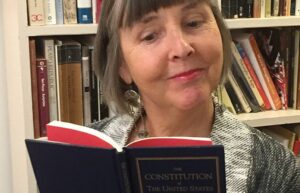
Meg Mott
The First Amendment prevents Congress from passing any laws that abridge the freedom of speech. But what does that actually mean?
On Sunday, April 2, professor Meg Mott considers the history of speech laws in the United States, how states and municipalities have tried to curb offensive speech, and how the Supreme Court has ruled on those efforts.
The talk, a Vermont Humanities supported presentation co-sponsored by AAUW Bennington and the Bennington Unitarian Universalist Fellowship, begins at 2 p.m. at the Unitarian Universalist Fellowship meeting house, 108 School St. It is free and open to the public. The building is handicapped accessible.
Mott will explore how speech fits into the life cycle of our democracy. While some argue that limits on speech are necessary for marginalized persons to feel welcome in the public sphere, others argue that the criminalization of speech serves the needs of the penal state more than the general public.
All arguments are welcome as we make full use of our reasoning powers to bring the First Amendment to life!
After twenty years of teaching political theory and constitutional law to Marlboro College undergraduates, Meg Mott has taken her love of argument to the general public. Her award-winning series Debating Our Rights on the first ten amendments brings civil discussions on contentious issues to public libraries and colleges.
Return to Table of Contents